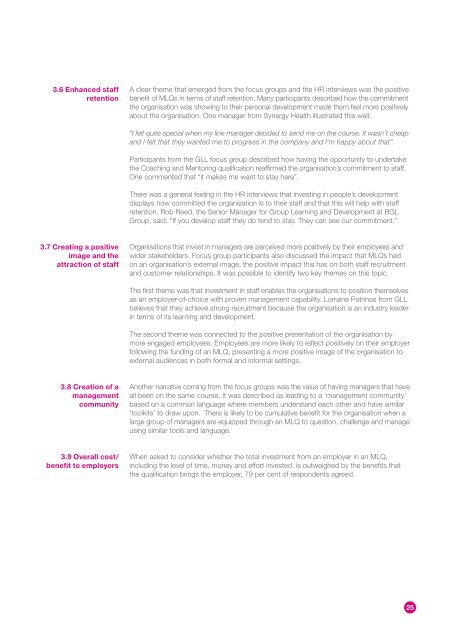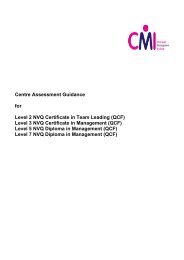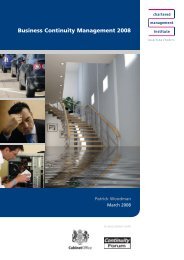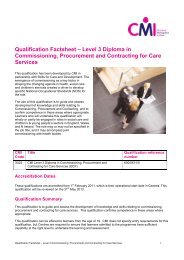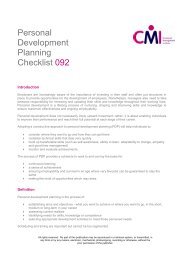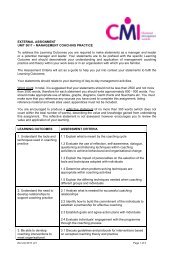The Value of Management and Leadership Qualifications
The Value of Management and Leadership Qualifications
The Value of Management and Leadership Qualifications
You also want an ePaper? Increase the reach of your titles
YUMPU automatically turns print PDFs into web optimized ePapers that Google loves.
3.6 Enhanced staffretentionA clear theme that emerged from the focus groups <strong>and</strong> the HR interviews was the positivebenefit <strong>of</strong> MLQs in terms <strong>of</strong> staff retention. Many participants described how the commitmentthe organisation was showing to their personal development made them feel more positivelyabout the organisation. One manager from Synergy Health illustrated this well:“I felt quite special when my line manager decided to send me on the course. It wasn’t cheap<strong>and</strong> I felt that they wanted me to progress in the company <strong>and</strong> I’m happy about that”.Participants from the GLL focus group described how having the opportunity to undertakethe Coaching <strong>and</strong> Mentoring qualification reaffirmed the organisation’s commitment to staff.One commented that “it makes me want to stay here”.<strong>The</strong>re was a general feeling in the HR interviews that investing in people’s developmentdisplays how committed the organisation is to their staff <strong>and</strong> that this will help with staffretention. Rob Reed, the Senior Manager for Group Learning <strong>and</strong> Development at BGLGroup, said: “If you develop staff they do tend to stay. <strong>The</strong>y can see our commitment.”3.7 Creating a positiveimage <strong>and</strong> theattraction <strong>of</strong> staffOrganisations that invest in managers are perceived more positively by their employees <strong>and</strong>wider stakeholders. Focus group participants also discussed the impact that MLQs hadon an organisation’s external image, the positive impact this has on both staff recruitment<strong>and</strong> customer relationships. It was possible to identify two key themes on this topic.<strong>The</strong> first theme was that investment in staff enables the organisations to position themselvesas an employer-<strong>of</strong>-choice with proven management capability. Lorraine Patrinos from GLLbelieves that they achieve strong recruitment because the organisation is an industry leaderin terms <strong>of</strong> its learning <strong>and</strong> development.<strong>The</strong> second theme was connected to the positive presentation <strong>of</strong> the organisation bymore engaged employees. Employees are more likely to reflect positively on their employerfollowing the funding <strong>of</strong> an MLQ, presenting a more positive image <strong>of</strong> the organisation toexternal audiences in both formal <strong>and</strong> informal settings.3.8 Creation <strong>of</strong> amanagementcommunityAnother narrative coming from the focus groups was the value <strong>of</strong> having managers that haveall been on the same course. It was described as leading to a ‘management community’based on a common language where members underst<strong>and</strong> each other <strong>and</strong> have similar‘toolkits’ to draw upon. <strong>The</strong>re is likely to be cumulative benefit for the organisation when alarge group <strong>of</strong> managers are equipped through an MLQ to question, challenge <strong>and</strong> manageusing similar tools <strong>and</strong> language.3.9 Overall cost/benefit to employersWhen asked to consider whether the total investment from an employer in an MLQ,including the level <strong>of</strong> time, money <strong>and</strong> effort invested, is outweighed by the benefits thatthe qualification brings the employer, 79 per cent <strong>of</strong> respondents agreed.25


